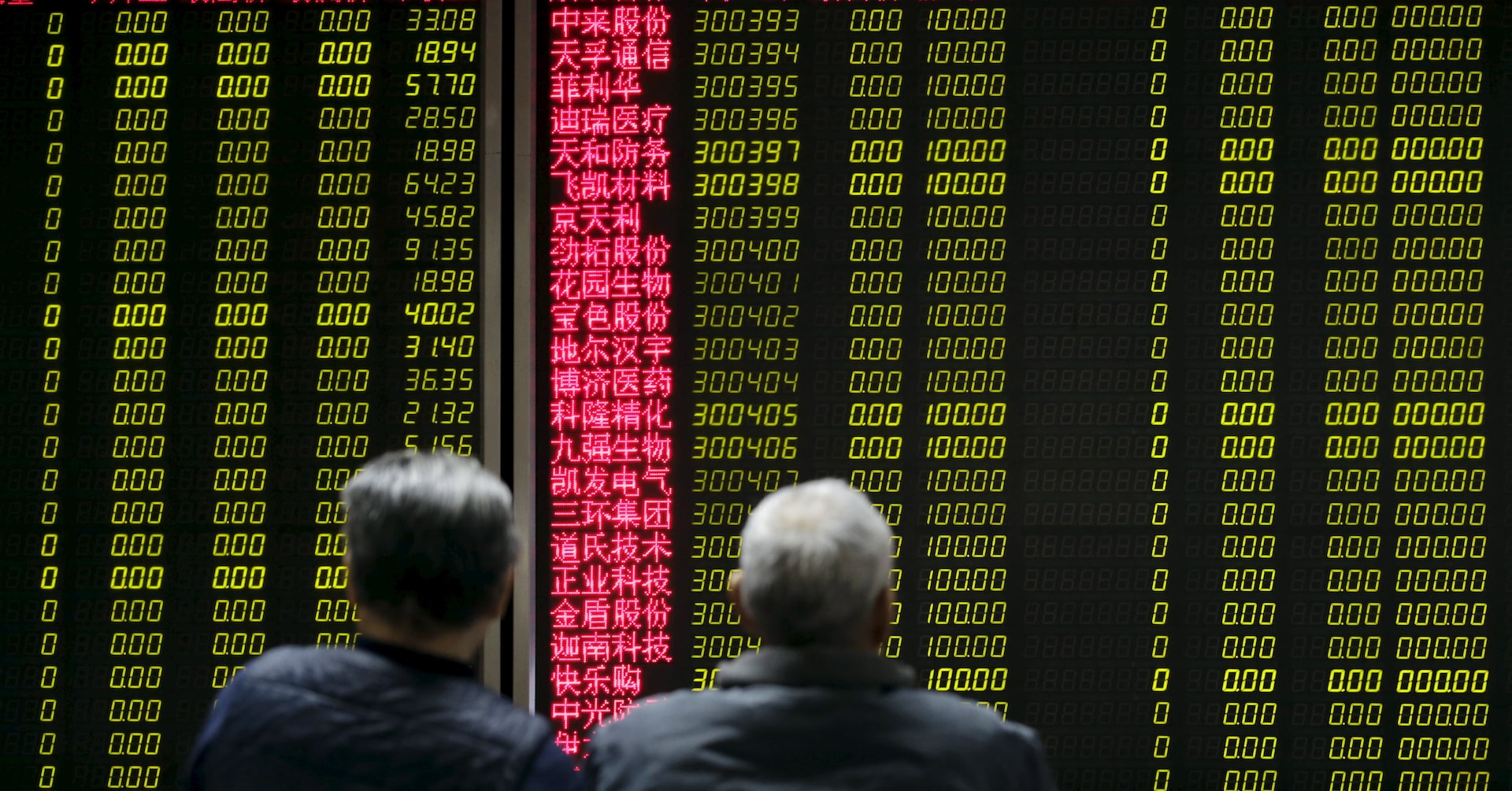Introduction: Stocks fall as Donald Trump imposes tariffs
Good morning, and welcome to our rolling coverage of business, the financial markets and the world economy.
Fears are growing of a global trade war, after China and Canada retaliated against the US following Donald Trump’s decision to impose sweeping tariffs on their exports to the US.
Hopes that Trump might have produced a last-minute reprieve were sunk yesterday, when the US president declared that the new 25% tariffs on imports from Canada and Mexico, and a new 10% levy on China, would begin today as scheduled.
This rattled Wall Street, where the S&P 500 share index tumbled by 1.7% last night – its biggest daily drop since 18 December – and the tech-focused Nasdaq slumped 2.6%.
What just happened?
The Dow just went from being up +300 points at the open to falling as much as -1,100 points in hours.
Between 10:00 AM and 3:30 PM ET, the S&P 500 erased a whopping $1.5 trillion in market cap.
Here’s exactly what you need to know.
(a thread) pic.twitter.com/nQpKOlrihB
— The Kobeissi Letter (@KobeissiLetter) March 3, 2025
Overnight, China and Canada unveiled retaliatory measures against the US.
China will impose fresh tariffs on a range of agricultural imports from the US next week. Its finance ministry said additional 15% tariffs would be imposed on chicken, wheat, corn and cotton, with further 10% tariffs on sorghum, soybeans, pork, beef, aquatic products, fruits, vegetables and dairy products.
Canadian prime minister Justin Trudeau said Ottawa would respond with immediate 25% tariffs on C$30bn ($20.7bn) worth of US imports. He said previously that Canada would target American beer, wine, bourbon, home appliances and Florida orange juice.
Mexico is expected to announce its response Tuesday morning.
It’s a jolt for investors who may have optimistically hoped that Trump might have had a last-minute change of heart.
Chris Weston, analyst at brokerage Pepperstone, says:
Market anxiety levels have been dialled up, and we see traders having to react aggressively and dynamically to the deluge of headlines and social posts confirming that tariffs on China, Mexico and Canada are to be implemented in full and as threatened.
The fact that we received confirmation of tariff implementation a day early and in full will surprise factions of the market, with a broad feeling that Mexico and to a lesser extent Canada could win a reprieve and see another suspension to the 25% tariff implementation date.
Stocks have fallen in some Asia-Pacific markets; in Japan, the Nikkei share index has dropped 1.2%, Australia’s S&P/ASX has lost 0.6%, while India’s main indices are a little lower, -0.2%.
China’s markets are slightly higher, though, perhaps lifted by hopes that policymakers may announce new stimulus measures as policymakers gather this week in Beijing for the annual parliamentary gathering.
European stock markets are set for a lower open, a day after the UK’s FTSE 100 index hit a record high as defence stocks surged on Monday.
The agenda
-
8am GMT: Kantar’s UK grocery inflation data
-
9.30am GMT: ONS on Mergers and Acquisitions involving UK companies – October to December 2024
-
2.25pm GMT: Chancellor Rachel Reeves speaking at Make UK conference
Key events
European stock markets are also dropping at the start of trading.
FTSE 100 drops away from record high
Britain’s stock market has opened in the red.
The FTSE 100 dropped by 57 points, or 0.65%, at the start of trading to 8813 points, a day after rising over 8,900 points for the first time ever.
Energy companies are leading the fallers, with BP down 4% and Shell losing 2.8%, tracking a drop in the oil price.
Mining companies, such as Anglo American (-2%) and Glencore (-2%) are also in the top fallers, reflecting concerns that a trade war will hit demand for commodities.
Beijing’s foreign ministry has said China will play along to the end if the United States is bent on waging a trade or tariff war, Reuters reports.
China’s countermeasures are to protect its own rights and interests, ministry spokesperson Lin Jian told a regular press conference on Tuesday, urging the U.S. to return to dialogue and cooperation as soon as possible.
Economists fear that Donald Trump’s new tariffs, and the retaliatory levies imposed by countries on the end of them, will be a drag on growth.
Mohit Kumar of investment bank Jefferies, says:
If Trump goes ahead with the tariff program as proposed, with more tariffs coming in April, we would need to revisit our relatively sanguine view on tariffs and the potential impact on growth in the US, Europe and globally.
Our view remains that tariffs are not an inflation story but a growth story, as the inflationary impact is like an impulse function with fades from year 2 onwards.
Canadian dollar and Mexican peso hit one-month lows
The Canadian dollar and the Mexican peso hit their lowest levels in a month after Donald Trump announced new tariffs are kicking in today.
The Canadian dollar weakened to 1.454 to the US dollar on Monday night, its weakest level since 3 February – the day Trump postponed sweeping new US tariffs on goods from Canada and Mexico.
The Mexican peso has lost 1.5% against the US dollar so far this week, hitting 20.8/$, again the lowest since 3 February.
Introduction: Stocks fall as Donald Trump imposes tariffs
Good morning, and welcome to our rolling coverage of business, the financial markets and the world economy.
Fears are growing of a global trade war, after China and Canada retaliated against the US following Donald Trump’s decision to impose sweeping tariffs on their exports to the US.
Hopes that Trump might have produced a last-minute reprieve were sunk yesterday, when the US president declared that the new 25% tariffs on imports from Canada and Mexico, and a new 10% levy on China, would begin today as scheduled.
This rattled Wall Street, where the S&P 500 share index tumbled by 1.7% last night – its biggest daily drop since 18 December – and the tech-focused Nasdaq slumped 2.6%.
What just happened?
The Dow just went from being up +300 points at the open to falling as much as -1,100 points in hours.
Between 10:00 AM and 3:30 PM ET, the S&P 500 erased a whopping $1.5 trillion in market cap.
Here’s exactly what you need to know.
(a thread) pic.twitter.com/nQpKOlrihB
— The Kobeissi Letter (@KobeissiLetter) March 3, 2025
Overnight, China and Canada unveiled retaliatory measures against the US.
China will impose fresh tariffs on a range of agricultural imports from the US next week. Its finance ministry said additional 15% tariffs would be imposed on chicken, wheat, corn and cotton, with further 10% tariffs on sorghum, soybeans, pork, beef, aquatic products, fruits, vegetables and dairy products.
Canadian prime minister Justin Trudeau said Ottawa would respond with immediate 25% tariffs on C$30bn ($20.7bn) worth of US imports. He said previously that Canada would target American beer, wine, bourbon, home appliances and Florida orange juice.
Mexico is expected to announce its response Tuesday morning.
It’s a jolt for investors who may have optimistically hoped that Trump might have had a last-minute change of heart.
Chris Weston, analyst at brokerage Pepperstone, says:
Market anxiety levels have been dialled up, and we see traders having to react aggressively and dynamically to the deluge of headlines and social posts confirming that tariffs on China, Mexico and Canada are to be implemented in full and as threatened.
The fact that we received confirmation of tariff implementation a day early and in full will surprise factions of the market, with a broad feeling that Mexico and to a lesser extent Canada could win a reprieve and see another suspension to the 25% tariff implementation date.
Stocks have fallen in some Asia-Pacific markets; in Japan, the Nikkei share index has dropped 1.2%, Australia’s S&P/ASX has lost 0.6%, while India’s main indices are a little lower, -0.2%.
China’s markets are slightly higher, though, perhaps lifted by hopes that policymakers may announce new stimulus measures as policymakers gather this week in Beijing for the annual parliamentary gathering.
European stock markets are set for a lower open, a day after the UK’s FTSE 100 index hit a record high as defence stocks surged on Monday.
The agenda
-
8am GMT: Kantar’s UK grocery inflation data
-
9.30am GMT: ONS on Mergers and Acquisitions involving UK companies – October to December 2024
-
2.25pm GMT: Chancellor Rachel Reeves speaking at Make UK conference


